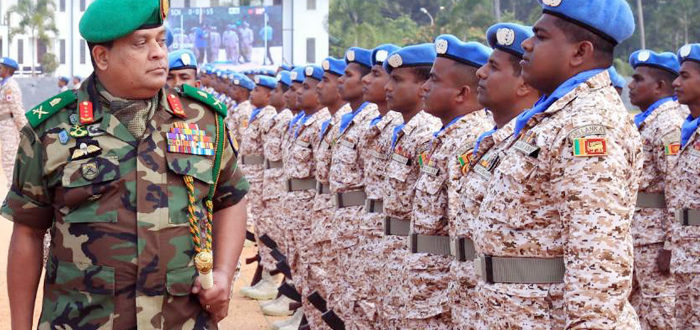Sri Lanka – halt the deployment
The Sri Lanka Campaign has previously argued that no Sri Lankan soldier should serve in a blue helmet so long as serious human rights violations of the kind described above – not to mention allegations of sexual abuse against children by Sri Lankan peacekeepers in Haiti between 2004-2007 – remain unaddressed.
| Suggested Reading | Conflict Background | GCCT |
By the Sri Lanka Campaign for Peace and Justice
243 Sri Lankan troops are set to be deployed to a UN peacekeeping mission in Mali. We want to stop that from happening, and would like to ask for your help in ensuring that it doesn’t.
Why? Because the UN itself recently pledged to scale back contributions of Sri Lankan peacekeepers, a move which followed international outcry over the appointment of alleged war criminal Shavendra Silva to Commander of the Sri Lankan army.
Predictably, Silva has been quick to seize on the recent announcement to try to whitewash his reputation and enhance his credibility. A series of shocking photos emerged on Wednesday in which the 243 Mali-bound troops, all wearing blue berets, presented a formal military suit to him. They are scenes that will be grossly offensive to Silva’s alleged victims, and deeply damaging to the image of the UN peacekeeping system.

But there is a further troubling aspect too: the Contingent Commander of the soldiers due to be deployed, P.G.C.S Gallage, hails from a unit of the Sri Lankan army, the Vijayahabu Infantry Regiment, understood to have had frontline combat experience during the final stages of the Sri Lankan civil war in 2009. It is at this time that some of the worst atrocity crimes of the 21st century are believed to have been committed by the Sri Lankan armed forces.

Take action:
The Sri Lanka Campaign has previously argued that no Sri Lankan soldier should serve in a blue helmet so long as serious human rights violations of the kind described above – not to mention allegations of sexual abuse against children by Sri Lankan peacekeepers in Haiti between 2004-2007 – remain unaddressed.
However, at the very minimum, we think that next week’s proposed deployment should be suspended until at least two things happen:
- First, we would like to see the UN publish clear guidelines, in view of its recent pledges, clarifying the circumstances under which Sri Lankan troops will be deployed to UN peacekeeping missions going forwards. Without this, it is simply impossible to understand how the policy has changed – and for observers like us hold the UN to its word.
- Second, the UN should outline exactly what screening and vetting measures have been undertaken (and by whom) with regards to the latest contingent of troops, and provide unequivocal assurances that neither P.G.C.S Gallage, nor any of those under his command, are potentially implicated in serious human rights violations. This is especially important in light of recent concerns about the quality and consistency of vetting procedures, not to mention the fact that problematic Sri Lankan contingent commanders have previously ‘slipped through the net’ and been repatriated from peacekeeping missions.
We have already written to members of the diplomatic community asking them to ensure that these basic pre-conditions are fulfilled. But you can help us too, by contacting the relevant part of the UN, the Department of Peacekeeping Operations (DPO), yourself. There are two ways in which you can do this:
- Share this blog piece on Twitter or Facebook, using the hashtag #HaltTheDeployment and tagging @UNPeacekeeping
- Send a short (and polite!) message to DPO using this contact form, highlighting our blog piece and outlining some of the key concerns.
With your help, we can #HaltTheDeployment – and ensure that UN peacekeeping remains a privilege for troop-contributing countries, and is never used as an opportunity for human rights abusers to launder their image.
The Sri Lanka Campaign for Peace and Justice is a member of the Global Coalition for Conflict Transformation, which is comprised of organizations committed to upholding and implementing the Principles of Conflict Transformation.
This article was originally published on the Sri Lanka Campaign website and is available by clicking here. The views expressed do not necessarily represent those of TransConflict.




















Pingback : TransConflict » November 2019 review